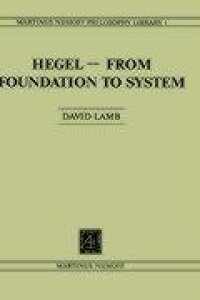
Ebook: Hegel—From Foundation to System
Author: David Lamb (auth.)
- Tags: Philosophy, Modern Philosophy
- Series: Martinus Nijhoff Philosophy Library 1
- Year: 1980
- Publisher: Springer Netherlands
- Edition: 1
- Language: English
- djvu
One of the guiding thoughts throughout this work is that G. W. F. Hegel is the philosopher of the modern age, that subsequent phil osophers, whether or not they have read his works, must take their stand in relation to Hegel. My purpose is not only to present Hegel, but to show that his influence has been felt for some time, even though his presence has not been explicitly acknowledged. In spite of a recent revival in Heglian scholarship, the history of philosophy in the English-speaking world is generally obscured by a period of darkness between Kant and the early inquiries of Russell and Frege. A place is assigned to Mill and Bentham, but even today very few Anglo-Saxon philosophers would be prepared to recognise Marx as a philosopher, although it is widely held that Marx was in some way influenced by Hegel, which is probably a good reason for not paying too much attention to the latter. At best, an understand ing of Hegel is relevant to an understanding of Marx, but it is not considered that Hegel made a significant contribution to the main stream of Western philosophy from Descartes onwards, and it is assumed that he is of little relevance to the 'linguistic revolution' pioneered by Wittgenstein, Ryle, and Austin.
This is a two-volume study of the work of 18th-century German philosopher Georg Hegel. When studying Hegel's work it is notoriously difficult to find a starting point. Volume I begins with his views on moral issues and progresses through political and legal theory and property and punishment. Volume II explores Hegel's ideas of logic, freedom and recognition, science, aesthetics, religion and feminism in the 20th century.